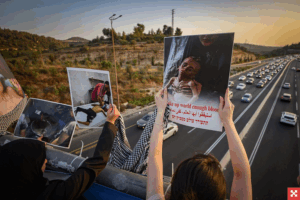The recognition of Palestine: what it does, what it doesn’t do, and why now

Israelis protest against the war and humanitarian crisis in Gaza, on a highway bridge near Jerusalem, 15 August 2025
Qassam Muaddi writes in Mondoweiss on 22 September 2025:
The United Kingdom, Canada, Portugal, and Australia officially recognized the State of Palestine in a series of separate but coordinated statements on Sunday, September 21. Other European and Western nations, including France, Belgium, New Zealand, and several other key allies of Israel, are expected to join the chorus of recognitions at today’s UN General Assembly meeting in New York. The summit is based on a joint Saudi-French initiative to revive a two-state solution called “the New York Declaration,” which was first issued at a conference on September 12. The conference was boycotted by the U.S, which opposed the summit.
In Sunday’s initial announcements of recognition, UK Prime Minister Keir Starmer said that “we are acting to keep alive the possibility of peace and a two-state solution,” adding that the ongoing Israeli bombardment campaign in Gaza, as well as its starvation of the Palestinian population, were “utterly intolerable.” Starmer also decried Israel’s acceleration of settlement building in the West Bank, which he said has caused the “fading” of hope in the two-state solution.
**** ****
Israel is also openly discussing plans for the annexation of the West Bank. One such plan, presented earlier in September by far-right Finance Minister Bezalel Smotrich, would see the annexation of 82% of the West Bank, including Bethlehem. This annexation plan would leave Palestinians with nothing but six isolated enclaves that make up less than 18% of the West Bank.
Israel has also accelerated the approval of the building of ambitious settlement projects, which aim to split the West Bank in two and “bury” the prospects of a Palestinian state, as articulated by Smotrich in mid-August.
What the recognition does
The recognition is a political act, and it has political implications.
Primarily, it opens the way for higher levels of diplomatic relations between Palestine and other countries that now recognize the occupied Palestinian territories as a part of Palestine’s national soil. This politically highlights the already-established illegality of Israel’s settlements in these territories.
Finally, the recognition of a Palestinian state preemptively regards Israel’s planned annexation of the West Bank as illegitimate.
What it doesn’t do
